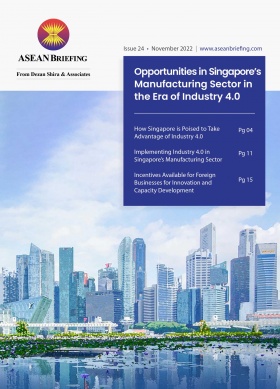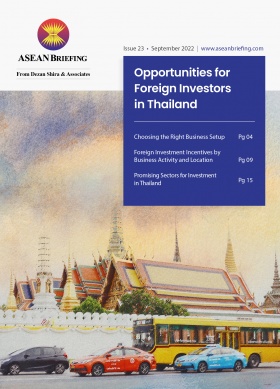Philippines to Prepare Green Lane for Strategic Investments
The Philippines is preparing to establish a green lane to ease strategic investments. Under the scheme, provincial governments and other judicial bodies involved in the issuance of business permits and licenses will have between 3-20 days to do so from the date of application, depending on the complexity of the projects.
The scheme is part of the government’s strategy to increase foreign investment which has seen a reduction compared to 2021, fueled by high inflation, a weakening Peso, and global economic slowdown.
The Philippines President Ferdinand Marcos Jr is preparing to sign an executive order to create a ‘green lane’ for strategic investments in the country.
Under the scheme, provincial government agencies and other quasi-judicial bodies involved in the issuing of business permits and licenses will be mandated to develop a green lane for strategic investments, which will be identified by the Department of Trade and Industry (DTI). As such, the concerned government offices must process a license or permit application within three working days in the case of simple transactions, seven working days for complex transactions, and 20 working days for highly technical transactions.
The government hopes this will improve the business climate and make the Philippines more attractive to foreign investors.
Slowing FDI inflow
The green lane scheme is part of government strategies to increase FDI inflow. The Philippines has seen a slowing down of FDI by 10 percent in the nine months to September of this year from US$7.5 billion to US$6.7 billion. This forced the country’s central bank to slash its FDI inflow forecast for 2022 to U$8.5 billion from US$10.5 billion.
A global economic slowdown, higher inflation, and the depreciation of the Peso are among the main reasons why FDI has remained subdued.
What is defined as a strategic investment?
Strategic investments will be defined by the DTI. These projects include:
- Investments considered to be of national significance by the DTI;
- Projects endorsed by the Fiscal Incentives Review Board;
- Investments endorsed by the Inter-Agency Investments Promotion Coordination Committee;
- Priority projects under the Strategic Investment Priority Plan; and
- Projects endorsed by the Board of Investments.
What other strategies has the Philippines government implemented to attract foreign investment?
Over the past year, the Philippines government has introduced several regulatory changes to ease doing business for foreign investors.
Amendments to the Retail Trade Liberation Act
In December 2021, the then President Rodrigo Duterte approved final amendments to the Retail Trade Liberalization Act (RTLA), or Republic Act No. 11595. The bill reduces the minimum paid-up capital requirements for foreign retail enterprises, removes the requirement for a certificate of pre-qualification to the Philippine Board of Investments (BOI), and lowers the investment requirements for each store owned by a foreign enterprise.
Under Republic Act No. 11595, a foreign-owned enterprise engaged in the Philippines retail trade now only requires PHP 25 million (US$500,000) as the minimum paid-up capital.
There are also no pre-qualification requirements, such as providing proof of the company’s track record in retailing which obligated the foreign business to obtain a certification of pre-qualification from the BOI. Republic Act No. 11595 has removed such requirements for foreign enterprises. They only need to have the minimum paid-up capital of PHP 25 million (US$500,000).
Foreign retailers that want to open more than one physical store must invest a minimum of PHP 10 million (US$200,000) per store. This is a reduction from the previous requirement of US$830,000 per store.
This minimum investment covers tangible and intangible assets, such as buildings, furniture, and storage facilities, among others.
Further, retail enterprises that are foreign-owned were required to offer a minimum of 30 percent equity through any stock exchange in the Philippines, within eight years from the start of their operations. This has now been removed under Republic Act No. 11595, meaning newly established foreign retail enterprises can remain privately owned.
100 percent foreign ownership of public services
The government also passed Senate Bill (SB) 2094, which allows the 100 percent foreign ownership of public services.
SB 2094 makes a clear distinction between the definition of public services and public utilities since under the 1987 Constitution, only firms that are at least 60 percent owned by Filipinos are given the authorization, certificate, and franchise to operate as a public utility.
SB 2094 narrows public utilities to just the following:
- Electricity distribution;
- Electricity transmission;
- Airports;
- Seaports;
- Water pipeline distribution and sewerage;
- Tollways and expressways; and
- Public utility vehicles.
This means that there will be no restriction on foreign ownership for industrial undertakings not classified as public utilities.
However, to protect national security, SB 2094 contains safeguards that limit foreign ownership in public services classified as critical infrastructure.
Critical infrastructure is defined as systems and assets that are so vital, they would have a debilitating impact on national security if they were destroyed or incapacitated.
The following public services are considered as critical infrastructure:
- Telecommunications;
- Airlines;
- Domestic shipping;
- Railways;
- Railways; and
- Subways.
Foreign businesses can own up to 40 percent of critical infrastructure – only if the country of the foreign national accords’ reciprocity to Philippine nationals under a treaty.
Entities managing or operating critical infrastructure are now mandated to act on complaints or service interruptions within one day from receiving the complaint. They are also required to submit a monthly report detailing the interruptions that occurred and the actions to have them resolved.
Amendments to the Foreign Investment Act
The government amended the Foreign Investment Act in March 2022 to finally allow international investors to set up and fully own domestic enterprises (including micro and small enterprises) in the Philippines.
Under the amendments, micro, small, and medium-sized enterprises (MSME) with paid-in capital of less than US$200,000 are reserved for Philippine nationals. However, foreign nationals can own an MSME with a minimum paid-in capital of US$100,000 – provided that the enterprise meets the following conditions:
- Utilizes advanced technology (to be determined by the Department of Science and Technology);
- Is endorsed as a startup enabler or as a startup in accordance with the Innovative Startup Act; or
- The company hires no less than 15 Filipino employees, a reduction from the previous requirement of 50.
To safeguard national interests, the amended FIA gives the President of the Philippines power to order the Inter-Agency Investment Promotion Coordination Committee (IIPCC) to review foreign investments that may threaten the safety, security, and well-being of Filipinos. Examples include foreign investments involving cyberinfrastructure, military-related industries, and pipeline transportation, among others.
About Us
ASEAN Briefing is produced by Dezan Shira & Associates. The firm assists foreign investors throughout Asia and maintains offices throughout ASEAN, including in Singapore, Hanoi, Ho Chi Minh City, and Da Nang in Vietnam, Munich, and Esen in Germany, Boston, and Salt Lake City in the United States, Milan, Conegliano, and Udine in Italy, in addition to Jakarta, and Batam in Indonesia. We also have partner firms in Malaysia, Bangladesh, the Philippines, and Thailand as well as our practices in China and India. Please contact us at asia@dezshira.com or visit our website at www.dezshira.com.
- Previous Article Implementing Industry 4.0 in Singapore’s Manufacturing Sector
- Next Article Philippines to Establish Sovereign Wealth Fund







